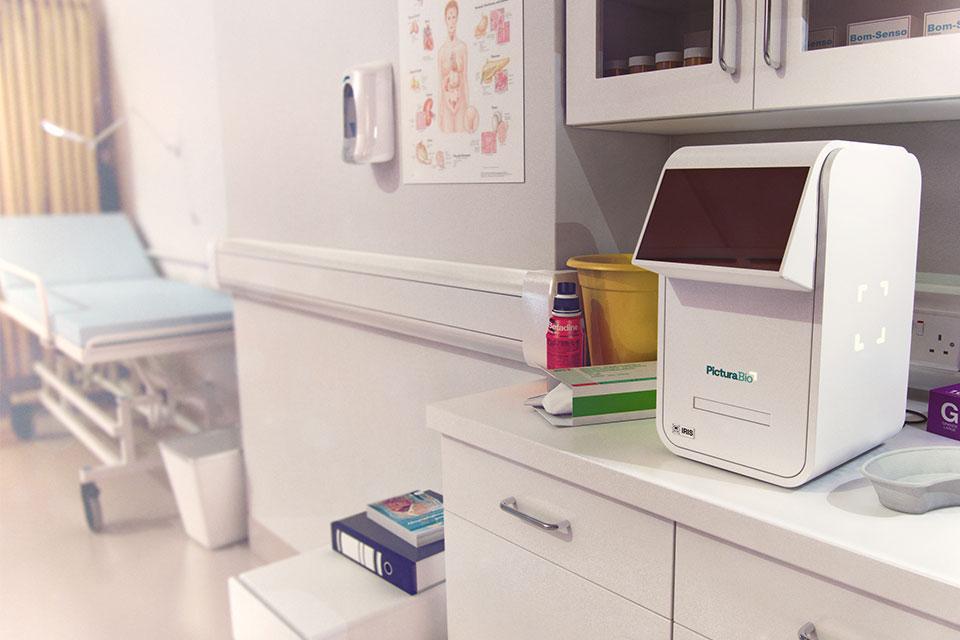Scientists have developed a world-first diagnostic test, powered by artificial intelligence, that can identify known respiratory viruses within five minutes from just one nasal or throat swab. The new diagnostic test could replace current methods that are limited to testing for only one infection – such as a lateral flow test for COVID-19 – or otherwise are either lab-based and time-consuming or fast and less accurate.
The new virus detection and identification methodology is described in a paper published in ACS Nano, authored by Department of Physics DPhil student Nicolas Shiaelis along with corresponding authors Professor Achillefs Kapanidis from the Department of Physics and Dr Nicole Robb from the University of Warwick and Visiting Lecturer at Oxford’s Department of Physics. The paper demonstrates how machine learning can significantly improve the efficiency, accuracy and time taken to not only identify different types of viruses, but also differentiate between strains.
Ground-breaking testing technology
Nicolas Shiaelis and Dr Robb collaborated with the John Radcliffe Hospital to validate the new method that uses AI software to identify viruses. The ground-breaking testing technology combines molecular labelling, computer vision and machine learning to create a universal diagnostic imaging platform that looks directly at a patient sample and can identify which pathogen is present in a matter of seconds – much like facial recognition software, but for germs. Preliminary research demonstrated that this test could identify the COVID-19 virus in patient samples and further work determined that the test could be used to diagnose multiple respiratory infections.
In the study, the researchers began by labelling viruses with single-stranded DNA in over 200 clinical samples from John Radcliffe Hospital. Images of labelled samples were captured using a commercial fluorescence microscope and processed by custom machine-learning software that is trained to recognise specific viruses by analysing their fluorescence labels, which show up differently for every virus because their surface size, shape and chemistry vary. The results show the technology is able to rapidly identify different types and strains of respiratory viruses, including flu and COVID-19, within five minutes and with >97% accuracy.
Point-of-care testing
In 2021, Nicolas Shiaelis and Dr Robb founded University of Oxford spin-out Pictura Bio that now licences the technology. ‘Our aim at Pictura Bio is to turn the method into a diagnostic test by creating a dedicated imager and single-use cartridge for use in point-of-care testing, with limited input from the user,’ explains Nicolas Shiaelis. ‘We are also expanding the number of viruses that the models are trained on and will eventually start looking at other pathogens, such as bacteria and fungi, in respiratory samples, blood and urine.’
Dr Robb continues: ‘Cases of respiratory infections in winter 2022/23 have hit record-breaking highs, increasing the number of people seeking medical help. This combined with the COVID-19 backlog, staff shortages, tighter budgets and an ageing population puts the NHS and its workforce under immense and unsustainable pressure.
Quick, cost-effective and accurate
‘Our simplified method of diagnostic testing is quicker and more cost-effective, accurate and future proof than any other tests currently available. If we want to detect a new virus, all we need to do is retrain the software to recognise it, rather than develop a whole new test. Our findings demonstrate the potential for this method to revolutionise viral diagnostics and our ability to control the spread of respiratory illnesses.’
Nicolas Shiaelis concludes: ‘It is inevitable that other COVID-like viruses will emerge. This reinforces the need for more advanced diagnostic testing technology so that we can reduce the impact of new viruses on public health and the NHS.’
Virus detection and identification in minutes using single-particle imaging and deep learning, Shiaelis et al, ACS Nano, 2023, 17, 697-710
Find out more about Pictura Bio: https://pictura.bio/

